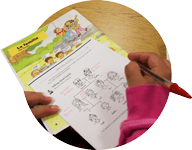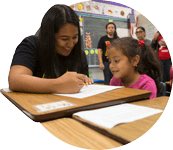- November 29, 2016
- By Charlie Wright
Imagine not being able to help your children with their homework or speak up in a parent-teacher conference, and learning only scraps of an unfamiliar language from what your kids pick up at school.
This is the plight of many Hispanic families in the D.C. area, and the University of Maryland has developed a solution.
After officials at nearby Hollywood Elementary School contacted UMD’s Office of Community Engagement, Associate Professor Ana Patricia Rodriguez created a new Spanish language course this fall that sends undergraduates there to teach English to Spanish-speaking parents.
“We are empowering the parents to advocate for their children,” says junior Maureen Wrightson. “If we give them the tools, then they’ll be able to advocate if needed.”
 The Washington region’s Hispanic population numbers 906,000, and more than half of this group is foreign-born, according to a Pew Research Center report. Hollywood Elementary has a Hispanic population of 48 percent, says parent liaison Aida Caballero, and many of the students’ parents don’t know English.
The Washington region’s Hispanic population numbers 906,000, and more than half of this group is foreign-born, according to a Pew Research Center report. Hollywood Elementary has a Hispanic population of 48 percent, says parent liaison Aida Caballero, and many of the students’ parents don’t know English.
“They are not able to communicate with the teachers,” she says. “The same goes for the teachers—they have not been able to communicate with the parents because of the language barrier.”
Rodriguez and her students spend an hour twice a week at the school, and on this particular Friday afternoon, as children shuffled to their buses and teachers packed up for the day, the laughter and cheering of eager adult students echoed from the library.
Eight mothers filed into seats and waited for directions from Rodriguez and three of her students in her “Spanish in the Community” class. Rodriguez opened the session by asking general questions to the group, which started a chain of conversation. After the first parent responded to Rodriguez, she queried the woman to her left, and so on. Simple repetitions of “Hello, how are you?” and “What is your name?” created excitement, with the regulars assisting the newcomers and each completed sentence being met with giggling and applause.
Rodriguez reviewed the homework with the class, a colorful map of a family tree, and wrote some of the more difficult names and terms on a chalkboard. Wrightson and two other students helped the parents fill in the blank spaces in their trees, with in-laws proving to be the most challenging to pin down.
“The idea was to develop classes for professional uses, and we thought that Spanish for educators would be a good idea,” says Rodriguez. “It puts into practice everything we are learning in the class, and the students have a very hands-on experience, so it’s great for future educators or people who are working in the community.”
 During the class, half of Rodriguez’s students helped the children of the parents with homework. The parents aren’t able to assist their kids just yet, so the students walk them through their assignments and read stories to them. The hope is that the parents will eventually be able to give homework assistance themselves, as well as communicate with their child’s teachers.
During the class, half of Rodriguez’s students helped the children of the parents with homework. The parents aren’t able to assist their kids just yet, so the students walk them through their assignments and read stories to them. The hope is that the parents will eventually be able to give homework assistance themselves, as well as communicate with their child’s teachers.
Rodriguez has already received permission to offer the course next semester, and plans to open it to all university students, not just Spanish speakers. She also wants to grow the program at Hollywood, adding more parents, especially some fathers. Rodriguez’ next goal is to bring the participants to campus, to encourage them to pursue higher education in the future.
“We’re hoping next semester to bring the moms and the children to Maryland Day, with the idea of encouraging a pipeline from the College Park community to the University of Maryland,” says Rodriguez. “That would be my dream, to have that open up.”
